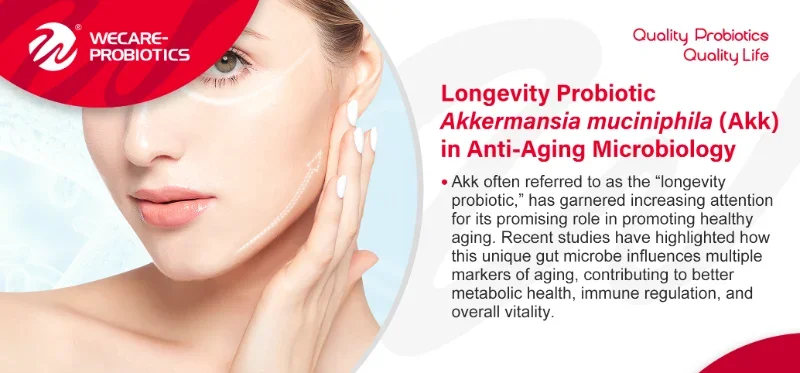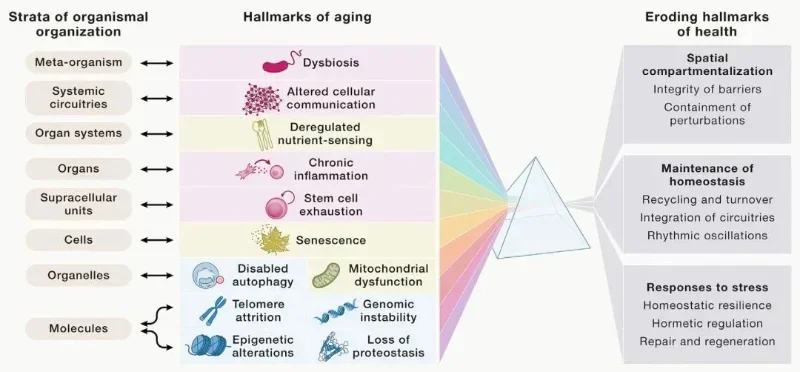Longevity Probiotic Akkermansia muciniphila in Anti-Aging Microbiology

Akkermansia muciniphila (AKK), often referred to as the “longevity probiotic,” has garnered increasing attention for its promising role in promoting healthy aging. Recent studies have highlighted how this unique gut microbe influences multiple markers of aging, contributing to better metabolic health, immune regulation, and overall vitality. As we dive into the potential of AKK as a longevity booster, it’s clear that this probiotic could be a key player in delaying the aging process and mitigating age-related diseases.
The 12 Hallmarks of Aging and the Role of Gut Microbiota
In 2023, researchers from the University of Oviedo in Spain and the University of Paris published a landmark review in Cell, identifying 12 key hallmarks of aging, including genomic instability, telomere attrition, epigenetic alterations, mitochondrial dysfunction, and gut microbiota imbalance. Among these hallmarks, gut microbiota balance has emerged as a critical factor influencing aging, with AKK playing a pivotal role.

How AKK Supports Anti-Aging and Longevity
AKK has been recognized for its unique ability to modulate several aging markers through gut microbiota regulation, inflammation control, and immune modulation. The anti-aging benefits of AKK are multifaceted, making it a standout in the world of probiotics.
1. Maintaining Gut Barrier Integrity
One of the core functions of AKK is its ability to thrive in the mucus layer of the gut, an environment where most probiotics cannot survive. By enhancing mucus secretion and maintaining the integrity of tight junctions in the intestinal lining, AKK plays a crucial role in preserving a healthy gut barrier. This is vital in preventing harmful substances from entering the bloodstream, thus reducing inflammation and promoting overall health.
2. Boosting Short-Chain Fatty Acids (SCFAs) Production
AKK has been shown to increase the production of short-chain fatty acids (SCFAs) like acetate and butyrate, which are essential for gut health and metabolic balance. SCFAs are known to reduce inflammation, improve insulin sensitivity, and support a healthy aging process. Recent studies have even linked higher acetate levels to improvements in age-related conditions.
3. The Impact of P9 Protein on Metabolism
AKK secretes a unique P9 protein that induces the secretion of GLP-1, a hormone known for regulating blood sugar levels and promoting weight loss. GLP-1 also stimulates thermogenesis in brown adipose tissue, contributing to metabolic health. Remarkably, AKK’s ability to induce GLP-1 offers a safer alternative to popular weight-loss drugs like semaglutide.
4. Anti-Inflammatory Effects Through Amuc_1100 Protein
AKK’s Amuc_1100 protein exhibits potent anti-inflammatory properties. It triggers a cascade of cytokines, including IL-10 and TNF-α, reducing the expression of pro-inflammatory markers like IL-6 and TNF-α. This regulatory effect on inflammation is essential in mitigating the risks of chronic diseases and promoting longevity.
5. Immune Modulation via Phospholipids
AKK’s immune-regulating properties are linked to specific phospholipids, such as a15:0-i15:0 PE. These molecules enhance the body’s immune response by modulating dendritic cell activity and regulating cytokine production. This finely tuned immune response helps maintain a balanced and effective defense system, crucial for healthy aging.
AKK in Longevity Research and Age-Related Diseases
Research has consistently shown that individuals who live longer, such as centenarians, tend to have higher levels of AKK in their gut. This correlation has sparked further studies into how AKK can be leveraged to combat various age-related diseases:
Cardiovascular Health: Lower levels of AKK are associated with poor response to statins in individuals with hyperlipidemia. Studies suggest that AKK may help regulate lipid metabolism, offering a new avenue for managing high cholesterol.
Neurodegenerative Diseases: In animal models of Alzheimer’s Disease (AD) and Amyotrophic Lateral Sclerosis (ALS), AKK has been found to reduce amyloid-beta plaque formation, improve NAD+ levels, and enhance cognitive function. These findings indicate that AKK could play a significant role in preventing or mitigating neurodegenerative conditions.
Bone Health: Osteoporosis patients often show reduced levels of AKK. Animal studies have demonstrated that transferring AKK or its derived extracellular vesicles from healthy donors to “brittle bone” mice can promote bone formation and reduce bone resorption, highlighting its potential in supporting bone health.
Wecare Probiotics: Leading the Charge in Probiotic Innovation
As research into the health benefits of AKK continues to expand, Wecare Probiotics is at the forefront of probiotic development. We specialize in the research, production, and application of probiotics for various industries, including food, dietary supplements, and personalized medicine. Our comprehensive solutions encompass probiotic powders, starter cultures, and customized probiotic formulations designed to meet the needs of our global clientele.
At Wecare Probiotics, we are committed to staying ahead of the curve by continuously monitoring and summarizing the latest AKK research. Our goal is to provide cutting-edge probiotics that not only improve health but also enhance longevity.
For more insights into how AKK and other probiotics can support healthy aging, stay tuned as we explore the latest trends and research in the field of probiotics.
Main references
1. https://www.cell.com/cell/fulltext/S0092-8674(22)01377-0
2. Depommier, C., Everard, A., Druart, C., Plovier, H., Van Hul, M., Vieira-Silva, S., Falony, G., Raes, J., Maiter, D., Delzenne, N. M., de Barsy, M., Loumaye, A., Hermans, M. P., Thissen, J. P., de Vos, W. M., & Cani, P. D. (2019). Supplementation with Akkermansia muciniphila in overweight and obese human volunteers: a proof-of-concept exploratory study. Nature medicine, 25(7), 1096–1103. https://doi.org/10.1038/s41591-019-0495-2
3. Zhai, R., Xue, X., Zhang, L., Yang, X., Zhao, L., & Zhang, C. (2019). Strain-Specific Anti-inflammatory Properties of Two Akkermansia muciniphila Strains on Chronic Colitis in Mice. Frontiers in cellular and infection microbiology, 9, 239.
4. Jian, H., Liu, Y., Wang, X., Dong, X., & Zou, X. (2023). Akkermansia muciniphila as a Next-Generation Probiotic in Modulating Human Metabolic Homeostasis and Disease Progression: A Role Mediated by Gut-Liver-Brain Axes. International journal of molecular sciences, 24(4), 3900. https://doi.org/10.3390/ijms24043900
5. Derrien, M., Vaughan, E. E., Plugge, C. M., & de Vos, W. M. (2004). Akkermansia muciniphila gen. nov., sp. nov., a human intestinal mucin-degrading bacterium. International journal of systematic and evolutionary microbiology, 54(Pt 5), 1469–1476. https://doi.org/10.1099/ijs.0.02873-0
6. Zeng, S. Y., Liu, Y. F., Liu, J. H., Zeng, Z. L., Xie, H., & Liu, J. H. (2023). Potential Effects of Akkermansia Muciniphila in Aging and Aging-Related Diseases: Current Evidence and Perspectives. Aging and disease, 14(6), 2015–2027.
7. Ma, J., Liu, Z., Gao, X., Bao, Y., Hong, Y., He, X., Zhu, W., Li, Y., Huang, W., Zheng, N., Sheng, L., Zhou, B., Chen, H., & Li, H. (2023). Gut microbiota remodeling improves natural aging-related disorders through Akkermansia muciniphila and its derived acetic acid. Pharmacological research, 189, 106687.
- Art
- Causes
- Crafts
- Dance
- Drinks
- Film
- Fitness
- Food
- Games
- Gardening
- Health
- Home
- Literature
- Music
- Networking
- Other
- Party
- Religion
- Shopping
- Sports
- Theater
- Wellness


